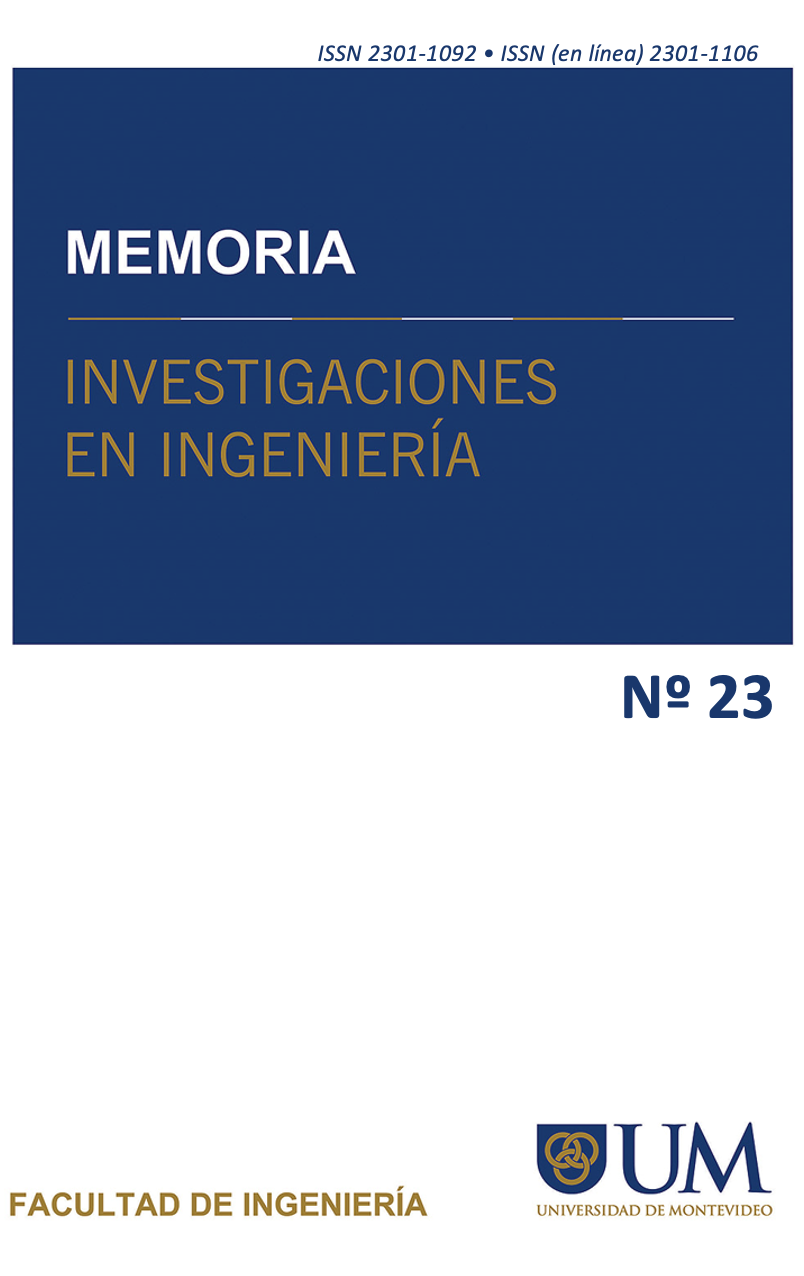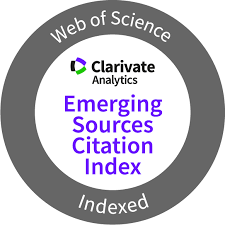Development of research competence of undergraduate engineering students in the process of graduation
methodological proposal and experience
DOI:
https://doi.org/10.36561/ING.23.5Keywords:
Scientific education, Mentoring, Methodologies, Scientific writingAbstract
A mentoring methodology for research works applied in the degree unit of the Computer Engineering career of the Universidad Politécnica Salesiana, in Guayaquil - Ecuador, during 2019-2020 is presented. This methodology develops a formative process, proposes a set of resources, in addition to proposing a series of principles and results. Students in the process of graduation are guided in the development and presentation of the results of their research in the form of articles to be submitted for evaluation by scientific committees in international academic events of relevance (with indexing) or scientific journals. In fact, each student develops a process of mentoring, five months of work (average), from the initial contact to the preparation of the document to be submitted to the respective journal or exhibition at the congress where the work was accepted. This methodology leads the undergraduate to research, with a technical approach, addressing real problems in areas where computer science and engineering can solve them. Through observation and survey, the perceptions, needs and feedback required by the student according to their level of training were determined. As a result of the application of this methodology, twenty-three students published articles with indexation.
Downloads
References
J. Llerena-Izquierdo and R. Ayala-Carabajo, “Training Methodology for Applied Research in the Graduation Mentoring Process of Engineering Students,” 2021 IEEE URUCON, pp. 531–535, Nov. 2021, doi: 10.1109/URUCON53396.2021.9647382.
H. V. Rosenzuaig, C. C. Escobar, and C. M. Parra, “La Academia Politécnica Naval frente al reto de la Investigación Académica,” Rev. Mar. No, vol. 971, pp. 60–66, 2019.
W. B. Johnson, L. L. Behling, P. Miller, and M. Vandermaas-Peeler, “Undergraduate research mentoring: Obstacles and opportunities,” Mentor. Tutoring Partnersh. Learn., vol. 23, no. 5, pp. 441–453, Jan. 2015, doi: 10.1080/13611267.2015.1126167.
F. Aguilar Gordón et al., “Experiencias docentes en tiempo de pandemia,” 2022. http://dspace.ups.edu.ec/handle/123456789/21823.
N. Balster, C. Pfund, R. Rediske, and J. Branchaw, “Entering research: A course that creates community and structure for beginning undergraduate researchers in the STEM disciplines,” CBE Life Sci. Educ., vol. 9, no. 2, pp. 108–118, Oct. 2010, doi: 10.1187/cbe.09-10-0073.
L. S. Behar-Horenstein, K. W. Roberts, and A. C. Dix, “Mentoring undergraduate researchers: An exploratory study of students’ and professors’ perceptions,” Mentor. Tutoring Partnersh. Learn., vol. 18, no. 3, pp. 269–291, Aug. 2010, doi: 10.1080/13611267.2010.492945.
J. Li and L. Luo, “Nurturing Undergraduate Researchers in Biomedical Sciences,” Cell, vol. 182, no. 1, pp. 1–4, Jul. 2020, doi: 10.1016/j.cell.2020.05.008.
M. Griffiths, “Publishing with undergraduates: some further observations,” Psychol. Teach. Rev., vol. 21, no. 1, pp. 76–80, 2015.
S. N. Davis and R. M. Jones, “Understanding the role of the mentor in developing research competency among undergraduate researchers,” Mentor. Tutoring Partnersh. Learn., vol. 25, no. 4, pp. 455–465, Aug. 2017, doi: 10.1080/13611267.2017.1403534.
J. K. Petrella and A. P. Jung, “Undergraduate Research: Importance, Benefits, and Challenges.,” Int. J. Exerc. Sci., vol. 1, no. 3, pp. 91–95, 2008, [Online]. Available: http://www.ncbi.nlm.nih.gov/pubmed/27182299%0Ahttp://www.pubmedcentral.nih.gov/articlerender.fcgi?artid=PMC4739295.
D. Mahatmya et al., “Pathways to Undergraduate Research Experiences: a Multi-Institutional Study,” Innov. High. Educ., vol. 42, no. 5–6, pp. 491–504, Dec. 2017, doi: 10.1007/s10755-017-9401-3.
S. N. Davis and R. Jones, “The Genesis, Evolution, and Influence of Undergraduate Research Mentoring Relationships,” Int. J. Scholarsh. Teach. Learn., vol. 14, no. 1, 2020, doi: 10.20429/ijsotl.2020.140106.
J. O. Shanahan, E. Ackley-Holbrook, E. Hall, K. Stewart, and H. Walkington, “Ten salient practices of undergraduate research mentors: A review of the literature,” Mentor. Tutoring Partnersh. Learn., vol. 23, no. 5, pp. 359–376, Jan. 2015, doi: 10.1080/13611267.2015.1126162.
G. Gardner, J. Forrester, P. Shumaker Jeffrey, M. Ferzli, and D. Shea, “Authentic Science Research Opportunities: How Do Undergraduate Students Begin Integration Into a Science Community of Practice?,” J. Coll. Sci. Teach., vol. 044, no. 04, 2015, doi: 10.2505/4/jcst15_044_04_61.
H. Walkington, K. A. Stewart, E. E. Hall, E. Ackley, and J. O. Shanahan, “Salient practices of award-winning undergraduate research mentors–balancing freedom and control to achieve excellence,” Stud. High. Educ., vol. 45, no. 7, pp. 1519–1532, Jul. 2020, doi: 10.1080/03075079.2019.1637838.
N. B. Whitticar and C. S. Nunemaker, “Reflections on Undergraduate Research Mentoring,” Biophys., vol. 1, no. 2, Jan. 2020, doi: 10.35459/tbp.2019.000112.
M. A. Marciniak, “Mentoring STEM Undergraduate Research Projects in a Large Community College,” Primus, vol. 30, no. 7, pp. 777–789, Aug. 2020, doi: 10.1080/10511970.2019.1639227.
Á. Gutiérrez, L. R. Guerrero, H. E. McCreath, and S. P. Wallace, “Mentoring experiences and publication productivity among early career biomedical investigators and trainees,” Ethn. Dis., vol. 31, no. 2, pp. 273–282, Apr. 2021, doi: 10.18865/ED.31.2.273.
V. L. Baker, M. J. Pifer, L. G. Lunsford, J. Greer, and D. Ihas, “Faculty as mentors in undergraduate research, scholarship, and creative work: Motivating and inhibiting factors,” Mentor. Tutoring Partnersh. Learn., vol. 23, no. 5, pp. 394–410, Jan. 2015, doi: 10.1080/13611267.2015.1126164.
M. Sánchez, “La Investigación Científica en la Formación de Estudiantes Universitarios,” Rev. Paradig. (Edición Cuadragésimo Aniversario 1980-2020), vol. 41, pp. 409–436, 2020.
D. D. Law, K. Hales, and D. Busenbark, “Student Success: A Literature Review of Faculty to Undergraduate Mentoring,” J. Empower. Teach. Excell., vol. 4, no. 1, pp. 22–40, Apr. 2020, doi: 10.15142/38X2-N847.
S. N. Davis, R. M. Jones, D. Mahatmya, and P. W. Garner, “Encouraging or Obstructing? Assessing Factors That Impact Faculty Engagement in Undergraduate Research Mentoring,” Front. Educ., vol. 5, p. 114, Jul. 2020, doi: 10.3389/feduc.2020.00114.
T. Giuliano, J. L. M. Skorinko, and M. Fallon, “Editorial: Engaging undergraduates in publishable research: Best practices,” Front. Psychol., vol. 10, no. AUG, p. 1878, Aug. 2019, doi: 10.3389/fpsyg.2019.01878.
M. E. Morrison et al., “Integrating Research into the Undergraduate Curriculum: 2. Scaffolding Research Skills and Transitioning toward Independent Research.,” Journal of undergraduate neuroscience education : JUNE : a publication of FUN, Faculty for Undergraduate Neuroscience, 2020. http://www.ncbi.nlm.nih.gov/pubmed/33880093.
G. A. Boysen et al., “Mentorship of undergraduate research experiences: Best practices, learning goals, and an assessment rubric.,” Scholarsh. Teach. Learn. Psychol., vol. 6, no. 3, pp. 212–224, Sep. 2020, doi: 10.1037/stl0000219.
T. A. Giuliano, “Guiding undergraduates through the process of first authorship,” Front. Psychol., vol. 10, no. APR, p. 857, Apr. 2019, doi: 10.3389/fpsyg.2019.00857.
J. Llerena Izquierdo, “El Trabajo en Equipo Aligera la Carga,” Jan. 10, 2021. https://pure.ups.edu.ec/es/publications/el-trabajo-en-equipo-aligera-la-carga.
Consejo de Educación Superior del Ecuador, “Reglamento de Régimen Académico Consejo,” 2019. https://www.ces.gob.ec/lotaip/Anexos Generales/a3_Reformas/r.r.academico.pdf.
Universidad Politécnica Salesiana, “Normativa - UPS,” 2018. https://www.ups.edu.ec/normativa/-/document_library_display/u8OILw1nqXw9/viewf/3169257.
J. Llerena-Izquierdo and R. Ayala-Carabajo, “La acción de acompañamiento salesiano del joven investigador universitario desde un proceso formativo,” in Memorias del IV Congreso de Educación Salesiana: desafíos juveniles para una transformación social, 2021, pp. 137–147.
Published
How to Cite
Issue
Section
License
Copyright (c) 2022 Joe Llerena-Izquierdo, Raquel Ayala-Carabajo

This work is licensed under a Creative Commons Attribution 4.0 International License.






















